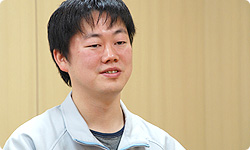4. The Peer-Evaluated Super Guide
Changing topics, I'd like to ask about the Super Guide . How did you come up with the idea for that?
Lots of people had said that New Super Mario Bros. for the Nintendo DS was easy…
It seems that not a few people who are skilled at video games thought it lacked something.
But on the other hand, people who aren't so great at video games said, for example, that no matter what they did, they couldn't get past the World 3 boss, so they gave up and stopped playing.
So even though we made New Super Mario Bros. for the DS to be a game that could be enjoyed also by people who hadn't played games much recently or who were playing one for the first time ever, there were still some who couldn't play all the way to the end.
That's right. If you ask those types of people what they do about those courses that they can't clear, they say they have someone who's good at video games do it for them. For example, they have their child play, watch and think, "Oh, so that's how you do it!" and then pick up from there themselves. When there's a difficult course, we wanted to provide images of how to clear it, and for people who just want to move on, we wanted to clear it for them, so we decided to include the Super Guide.
In other words, for people who don't have a good player at hand to clear a course for them, the game will do it for them.
That's right. When there's a boss you just can't beat no matter what, a lot of people just stop playing.

I see.
I wanted game videos that would make people who saw them think, "Oh, I get it…" and decide to give it a shot themselves, so I asked Mukao-san to record some gameplay like that. To put it another way, I just tossed it at him. (laughs)
Just like that? With no further instruction?
I drew up some guidelines, but for the most part, I just threw it at him. (laughs)
That wasn't very nice! (laughs)
(laughs)
Mukao-san, when he told you to record some gameplay that would make viewers think, "Oh, I get it," were you stumped?
Yeah. (laughs) We divided it up among about 20 designers and sound staff. But with each person doing his or her own recording, some people were better than others, and the standard was uneven. So first we decided on five leaders who determined the quality or level of gameplay.
How did they decide?
First, Asuke-san would come up with a tentative plan to serve as a standard, addressing such matters as whether or not to hit a Question Block if there was one or whether to get all the coins or not, and so on.
So first the director came up with a gameplay policy to be the standard. If the demo play is too overwhelmingly good, players who see that may lose hope, but if it isn't very good, they might get a little irritated. Finding the right balance was difficult.
Yeah. If you dash and then jump - boing boing - and move on, the people who see that may not think they can do it, so we decided not to use dashing or wall jumping too much - to play slowly and calmly and clear the stages that way. We settled on several rules, such as not playing too well and not performing any unnecessary actions, and the staff recorded some gameplay, but even then, there was some variance. So we gathered everyone together and held a meeting to watch each other play.

You watched everyone's demo play and evaluated each other.
Like so-and-so is a little too good.
How frustrating to be criticised for being too good! (laughs)
And stuff like, "You didn't need to get that mushroom."
That's a weird meeting! (laughs)
(laughs)
Asuke-san's standards were fairly strict. He would say things like, "Try to hit the blocks a little more smoothly. But because we held that meeting, we came to share one standard level of play, whereas it had been all over the place before. One of my senior co-workers put it a neat way. He said, "Play considerately."
Play considerately? Oh, I see. Play as if saying, "If you do this, you'll be able to do it, too!" and "Play in a way that gives players courage!"
Exactly. We tried to play with consideration, and we hardly did anything very difficult. As much as possible, we didn't do anything fancy like dashing, wall jumping, or jumping with tricky timing, and we stayed away from any unnecessary movements.
But when someone tells you not to do anything unnecessary, you can get nervous. Time after time you think, "Argh! I did something unnecessary again! One more time!" Recording like that could almost reduce one to tears!

You're right! Some courses are really long, and right at the very end I'd mess up and…
You'd have to do it over again.
I'd be like, "I'm recording, so leave me alone!"
Everyone on the staff recording the demos had idiosyncrasies in the way they played. To take me, for example. After I jump forward, I push the +Control Pad so I face backwards, and come straight down when I land, and I couldn't break that habit no matter what.
Distinctive playing like that was off limits. So I would say, "That kind of playing is forbidden."
I see. Putting smiles on all our players' faces is a hard thing to do! (laughs)
But by playing like that - and I'm really not that good myself - we on the development staff learned how hard it is to play without dashing, or whatever. In the end, the demo play for all of the levels looked so similar that you wouldn't think 20 people had worked on it.
